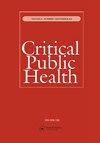从合作者到同事:以社区为基础的项目科学方法,使肯尼亚同性恋、双性恋和其他男男性行为者社区参与艾滋病毒研究
IF 2.3
3区 医学
Q2 PUBLIC, ENVIRONMENTAL & OCCUPATIONAL HEALTH
引用次数: 0
摘要
摘要自20世纪90年代以来,研究人员利用基于社区的参与式方法实现了与当地社区相关的成果,建立了协作和可持续的研究基础设施,并解决了知识生产中的差异。尽管有这些优势,社区和研究人员质疑它在解决合作研究遭遇中固有的权力不平衡方面的成功。在这篇方法学论文中,我们描述了一种新颖的基于社区的项目科学方法,用于指导肯尼亚三个县的男男性行为者进行艾滋病毒自我检测的跨学科研究项目。根据民族志的实地记录,我们详细介绍了社区研究人员及其学术和项目合作伙伴如何在研究过程的各个阶段进行合作,包括研究设计和数据收集。重要的是,社区研究人员还在数据分析和传播中发挥了不可或缺的作用,远远超出了“社区参与”在全球卫生研究中的传统作用。我们还介绍了社区研究人员与其同行进行的定性访谈的结果,以便为在各自国家的情况下推出艾滋病毒自我检测试剂盒提供信息。我们的方法强调,让社区直接参与证据生产,可以使研究成果——由社区代表自己拥有和产生——更迅速、更有效地投入到社区主导的项目交付中。关键词:基于社区的参与性研究男男性行为者hiv检测披露声明作者未报告潜在的利益冲突。肯尼亚高等法院于2019年维持了《肯尼亚刑法》第162条的原判,该条款是英国殖民时代法律的遗留物,将“违反自然秩序的肉体知识”定为犯罪。这项工作得到了比尔和梅林达·盖茨基金会的支持[OPP-11191068]。本文章由计算机程序翻译,如有差异,请以英文原文为准。
From collaborator to colleague: a community-based program science approach for engaging Kenyan communities of gay, bisexual and other men who have sex with men in HIV research
ABSTRACTSince the 1990s, researchers have used community-based participatory approaches to achieve outcomes relevant to local communities, to build collaborative and sustainable research infrastructures, and to address disparities in knowledge production. Notwithstanding these strengths, communities and researchers have questioned its success in addressing power imbalances inherent in collaborative research encounters. In this methodological paper, we describe a novel community-based program science approach to guide an interdisciplinary research project on HIV self-testing among men who have sex with men in three Kenyan counties. Drawing on ethnographic field notes, we detail how community researchers and their academic and programmatic partners collaborated through all phases of the research process, including research design and data collection. Importantly, community researchers also played an integral role in data analysis and dissemination, going well beyond the conventional role of ‘community engagement’ in global health research. We also present findings from qualitative interviews conducted by community researchers with their peers to inform the rollout of HIV self-testing kits in their respective county-contexts. Our approach highlights that engaging community directly in evidence production allows research findings – owned and generated by communities on their own behalf – to be fed more swiftly and effectively into community-led program delivery.KEYWORDS: Community-based participatory researchmen who have sex with menHIV testing Disclosure statementNo potential conflict of interest was reported by the author(s).Notes1. Article 162 of the Kenyan Penal Code, a relic of British colonial-era laws criminalizing ‘carnal knowledge against the order of nature’, was upheld by the Kenyan High Court in 2019.Additional informationFundingThe work was supported by the Bill and Melinda Gates Foundation [OPP-11191068].
求助全文
通过发布文献求助,成功后即可免费获取论文全文。
去求助
来源期刊

Critical Public Health
Multiple-
CiteScore
5.90
自引率
7.10%
发文量
36
期刊介绍:
Critical Public Health (CPH) is a respected peer-review journal for researchers and practitioners working in public health, health promotion and related fields. It brings together international scholarship to provide critical analyses of theory and practice, reviews of literature and explorations of new ways of working. The journal publishes high quality work that is open and critical in perspective and which reports on current research and debates in the field. CPH encourages an interdisciplinary focus and features innovative analyses. It is committed to exploring and debating issues of equity and social justice; in particular, issues of sexism, racism and other forms of oppression.
 求助内容:
求助内容: 应助结果提醒方式:
应助结果提醒方式:


